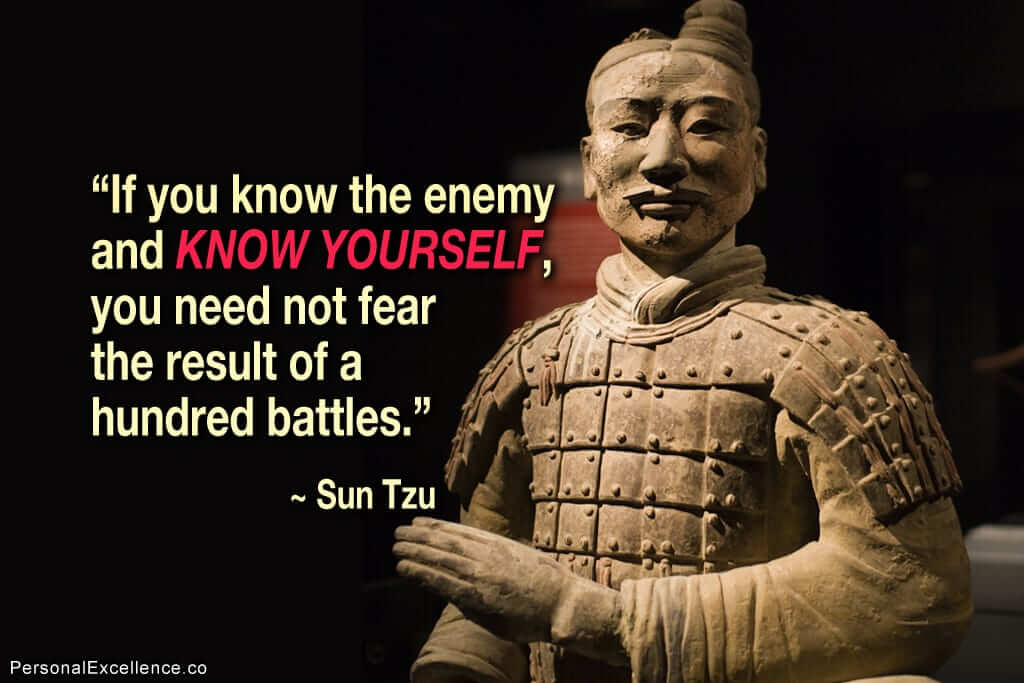‘The Art of War’ is a military strategy book written by the 6th century Chinese author Sun Tzu. It is a classic and is considered to be one of the greatest books ever written on the subject. The principles explained in this book are applicable in various fields of planning, business tactics or even political campaigning. It was even used by the Brazilian football coach to plot his match strategy for the 2002 World Cup. Wherever there is a ‘versus’ scenario, these tactics can be used.
1. Realize that the victorious strategist is he who only seeks battle after the victory has been won. He who is destined to lose, fights first and then looks for victory. It is the acme of excellence to not only win, but to master winning at ease. The clever fighter makes no mistakes and establishes the certainty of victory, for it means conquering an enemy that is already defeated. He secures his position so that he may seem invincible and judiciously hides his weaknesses.
2. Understand that the control of a large force is no different than controlling of a few men, being merely the question of dividing the force. The true leader knows both how to utilize his resources and when to make a decision. He plans by making a combination of direct and indirect tactics. He combines his forces so that the enemy may bear similarity to an egg in the path of a grinding stone. Strategy without tactics is the slowest route to victory. Tactics without strategy is the noise before defeat.
3. Know that to fight and conquer in all your battles is not supreme excellence.Supreme excellence consists of breaking you’re enemy’s resistance without fighting. It is better to recapture an entire army, establishment or company than to destroy it. Hence, the highest form of generalship is to foil you’re enemy’s plans. Second best is to prevent the junction of his forces. Next in order is to attack his forces in the field(direct encounter) and the worst is to conquer his forces. The rule is to avoid destruction if possible. The skillful leader subdues his enemies troops without any fighting. He captures their kingdom without laying siege to them. He overthrows their nation without lengthy operations. He triumphs without losing a man.
4. Know that it is an essential in war to know when to attack. If we outnumber the enemy, we attack them. When evenly matched, we may offer battle. When slightly inferior, we may overcome by superior strategy. If unequal on all accounts, we must flee. For a greater force will, in the end, overcome the inferior force. There are thus 5 essentials to victory… He will win:
- who knows when to fight and when not to
- who knows how to handle both superior and inferior forces.
- who’s army is animated by the same spirit throughout all the ranks.
- who prepares and takes the enemy unprepared.
- who has full control over his decisions.
5. Know your enemy as you know yourself.In war, let your objective be victory and not lengthy campaign. Avoid prolonged warfare. Invade your enemy’s resources, for 1 quota of his provisions is equivalent to 20 of our own. Use your enemy’s strength to augment your own.
6. Understand that the clever combatant imposes his will on the enemy and does not allow his will to be imposed on him. You can be successful only if you attack those points that are undefended and only defend those which cannot be attacked. Throw in you’re enemy’s way that which he cannot comprehend. This will force him to come out even of the darkest of shadows and reveal himself. Divide his forces and keep your forces concentrated. Scheme so as to discover an enemy’s plan. Find his vulnerabilities. Compare your strength to his. Supreme strategy always aids the inferior side. Do not repeat those tactics that have previously gained you victory. Let your methods be regulated by the infinite variety of circumstances.
7. Accept that soldiers must be treated with humanitarianism but controlled by the means of iron discipline. Treat them as your own children and they will stand by you unto death.





























